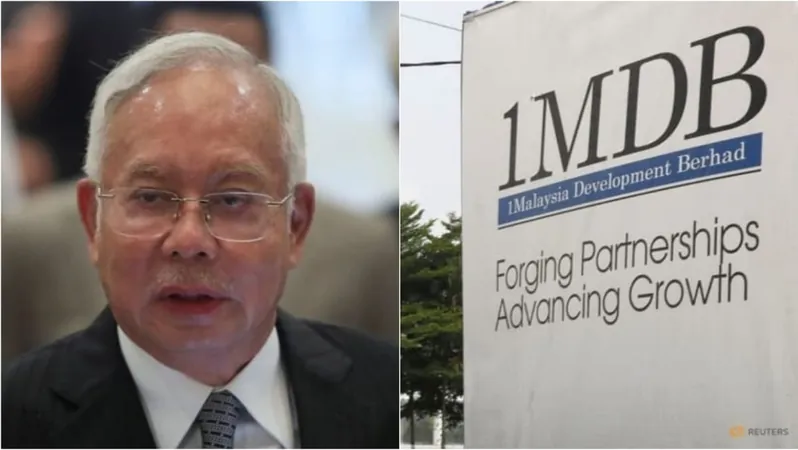
Former PM Najib Razak Sparks Political Upheaval from Jail with House Arrest Plea
2025-01-13
Author: Mei
KUALA LUMPUR: Najib Razak, the notorious former Prime Minister of Malaysia, continues to shake the political landscape despite being behind bars, as he seeks to serve his six-year sentence under house arrest.
This high-stakes maneuver, analysts suggest, lacks substantial legal footing, further entangling the nation in a political quagmire. Najib's recent legal endeavors have placed Prime Minister Anwar Ibrahim in a precarious position, where he faces accusations from Najib's supporters of intentionally suppressing a contentious declaration regarding house arrest by the former king involved in a pardons decision made nearly a year ago.
In a surprising turn of events, Anwar publicly addressed Najib's pardon application over the weekend, which the government had previously deemed subject to the Official Secrets Act. He confirmed that an addendum related to the pardon was submitted to the previous attorney-general and subsequently to the royal palace.
The situation has escalated recently. Last year, the ex-king reduced Najib's prison term for corruption and money laundering—stemming from receiving approximately $10 million linked to the 1Malaysia Development Berhad (1MDB) scandal—from 12 to six years. A recent ruling from the Court of Appeal now allows Najib the opportunity to pursue his house arrest plea in the High Court, following claims by his lawyer of a former royal decree permitting such an arrangement.
This ongoing saga has created friction within Anwar's coalition government, which includes the United Malays National Organisation (UMNO), a party historically led by Najib. UMNO leaders loyal to Najib are lobbying the current king, Sultan Ibrahim, for a full pardon, igniting tensions with coalition partners who argue that Najib was afforded a fair trial.
The implications of Najib's legal battle extend beyond personal ramifications, potentially threatening a constitutional crisis regarding the boundaries of royal authority in Malaysia. The current laws do not provide for house arrest, though the government has hinted at the possibility of legislation permitting it in the future. This has stirred discussions about the extent of the monarchy's role in the pardoning process amidst a fragmented political landscape.
Political observers note that Najib's ongoing legal challenges maintain his relevance in Malaysian politics and pose a challenge to Anwar's administration, which faces growing criticism for its handling of this complex situation. Charles Santiago, a former Member of Parliament, remarked that while Najib is finding ways to stay politically alive, significant changes in the political scene are unlikely.
A senior member of Najib's legal team mentioned that the judicial proceedings over the house arrest plea could span multiple years. As these developments unfold, Anwar's administration has sought to clarify its stance on the matter, prompting the Legal Affairs Division to announce that no additional filings related to Najib's pardon had been submitted.
However, in a further twist, the Malaysian government has pursued a gag order in the High Court to limit public discourse surrounding this controversial addendum. The court has required a formal application to be filed by January 20.
Despite his incarceration since August 2022, when the Federal Court upheld his conviction for corruption, Najib remains a highly polarizing figure within Malaysian politics. While his party's hold on power has waned, the factions within UMNO continue to fight for influence, with some arguing for a complete break from Najib's past to regain public support.
The seeds of this controversy were planted late last year when Najib's faction secured a royal clemency from the outgoing king, which included not only a reduced sentence but also claims of a directive for house arrest. This has led to increasing polarization within Malaysian politics as various factions leverage the situation to challenge the Anwar government’s authority.
The loud and messy political discourse surrounding Najib’s house arrest plea is set against a backdrop of intensified factional rivalries, particularly among ethnic Malay parties, which may threaten the stability of the current government. With Najib's loyal supporters rallying behind him, the political stakes in Malaysia continue to rise, entrenching Najib at the center of the country's political mudslinging as leaders from rival parties accuse the government of treachery regarding royal decrees.
As the High Court prepares to hear the case regarding Najib's house arrest, the prospect of navigating constitutional boundaries looms large, making it imperative for the government to manage this delicate situation effectively as tensions simmer within the divided political landscape.


 Brasil (PT)
Brasil (PT)
 Canada (EN)
Canada (EN)
 Chile (ES)
Chile (ES)
 Česko (CS)
Česko (CS)
 대한민국 (KO)
대한민국 (KO)
 España (ES)
España (ES)
 France (FR)
France (FR)
 Hong Kong (EN)
Hong Kong (EN)
 Italia (IT)
Italia (IT)
 日本 (JA)
日本 (JA)
 Magyarország (HU)
Magyarország (HU)
 Norge (NO)
Norge (NO)
 Polska (PL)
Polska (PL)
 Schweiz (DE)
Schweiz (DE)
 Singapore (EN)
Singapore (EN)
 Sverige (SV)
Sverige (SV)
 Suomi (FI)
Suomi (FI)
 Türkiye (TR)
Türkiye (TR)
 الإمارات العربية المتحدة (AR)
الإمارات العربية المتحدة (AR)